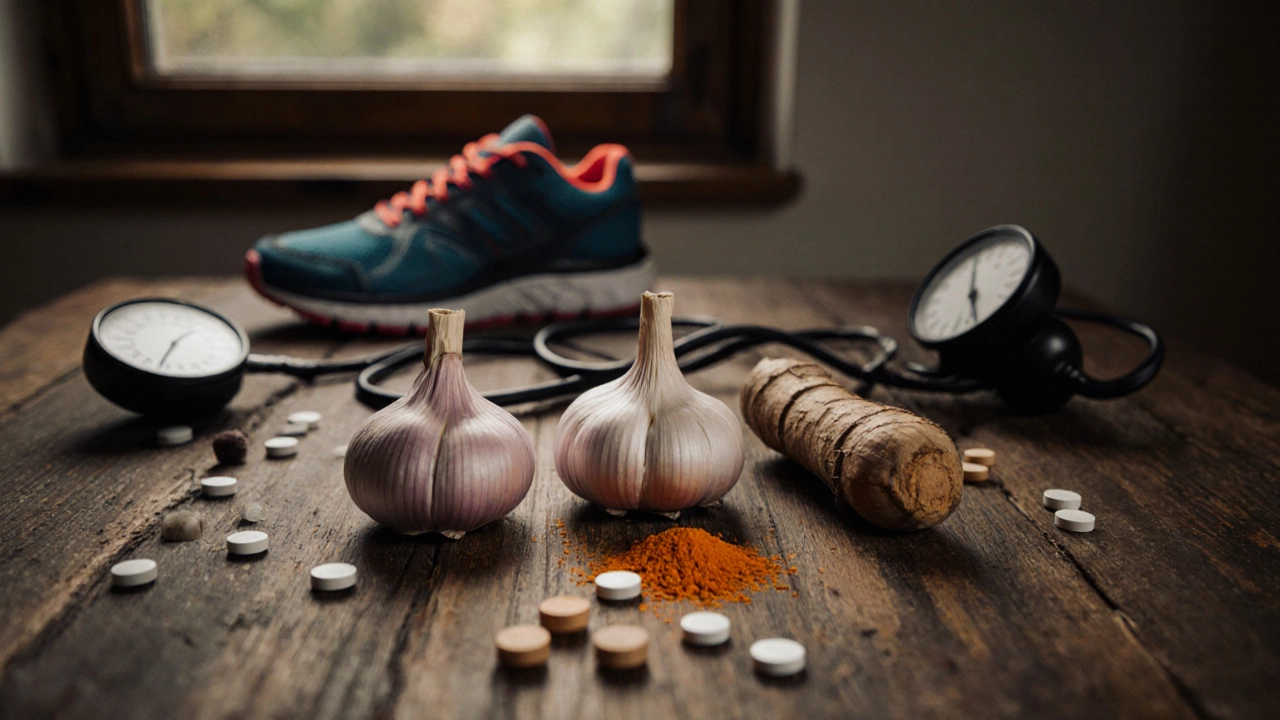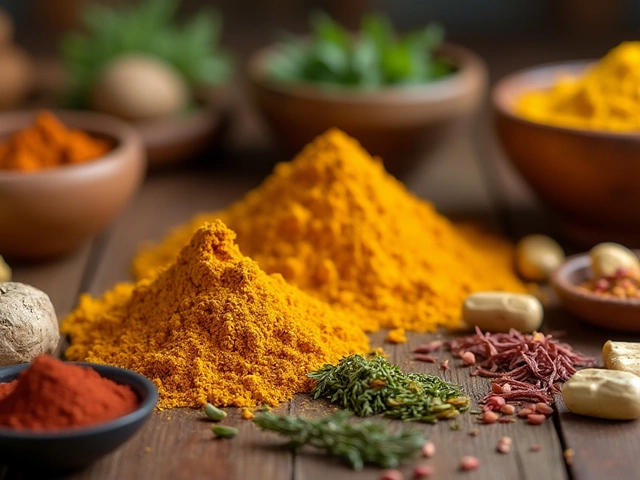- Home
- Herbal Medicine
- What Are the 3 Main Herbal Supplements Everyone Should Know About?

What Are the 3 Main Herbal Supplements Everyone Should Know About?
Herbal Supplement Interaction Checker
Select a Supplement
Select Your Medications
Interaction Results
Select a supplement and medications to see potential interactions.
Safety Information
Important: Always consult your healthcare provider before starting any new supplement, especially if you're taking medications.
Consultation Recommended: If you have any health conditions or are taking medications, discuss with your doctor before using herbal supplements.
When people ask about the top herbal supplements, they’re usually looking for something that actually works - not just another trendy powder with a fancy name. The truth is, out of hundreds of herbs used around the world, only a few have strong, consistent evidence backing their use in everyday health. These aren’t magic pills, but they’re the ones that show up again and again in clinical studies, traditional medicine systems, and real-life use by millions. If you’re curious about what herbal supplements actually make a difference, here are the three that stand out.
Turmeric (Curcumin)
Turmeric isn’t just a spice you sprinkle on rice. Its active compound, curcumin, has been studied in over 12,000 scientific papers - more than most pharmaceutical drugs. It’s a powerful anti-inflammatory and antioxidant. People use it for joint pain, digestive issues, and even to support brain health.
One 2016 study in the Journal of Medicinal Food found that curcumin was as effective as ibuprofen for reducing knee pain in osteoarthritis patients - without the stomach irritation. That’s why it’s so popular in places like India, where turmeric milk (haldi doodh) is a nightly ritual for adults and kids alike.
But here’s the catch: curcumin doesn’t absorb well on its own. That’s why most effective supplements combine it with black pepper extract (piperine). Piperine boosts absorption by up to 2,000%. Look for products that list both curcumin and piperine on the label. Doses between 500-1,000 mg of curcumin per day are common in research. Don’t expect instant results - it usually takes 4 to 8 weeks to feel the difference.
Ashwagandha
Ashwagandha is an adaptogen - a herb that helps your body handle stress. It’s been used in Ayurveda for over 3,000 years, and modern science is catching up. In a 2019 randomized trial published in Medicine, adults taking 240 mg of ashwagandha daily for 60 days reported significantly lower cortisol levels and reduced feelings of stress compared to those taking a placebo.
It’s not just about calming nerves. Ashwagandha also helps with sleep quality, energy levels, and even testosterone in men. One study showed a 15% increase in testosterone and a 17% increase in sperm count after three months of use in men with low fertility.
It’s not a quick fix. You need to take it consistently for at least 4 weeks. Most people notice better sleep and less anxiety after 2-3 weeks. It’s best taken in the evening because it has a mild sedative effect. Avoid it if you’re pregnant, have an overactive thyroid, or are on immune-suppressing drugs.
Garlic (Allicin)
Garlic might smell strong, but its power comes from allicin - the compound released when you crush or chop fresh cloves. It’s been used for centuries to fight infections, lower blood pressure, and support heart health.
A 2021 meta-analysis in the Journal of Nutrition reviewed 14 clinical trials and found that garlic supplements reduced systolic blood pressure by an average of 8-10 mmHg in people with high blood pressure. That’s similar to the effect of some first-line medications.
It also helps lower LDL (bad) cholesterol by 10-15% and has antimicrobial properties that may reduce the frequency and severity of colds. One study showed people taking garlic extract had 63% fewer colds over 12 weeks compared to those taking a placebo.
Most supplements use aged garlic extract because it’s gentler on the stomach and more stable than raw garlic. Look for products that guarantee allicin potential - not just garlic powder. A typical dose is 600-1,200 mg per day, split into two doses. If you’re on blood thinners like warfarin, talk to your doctor first - garlic can increase bleeding risk.

Why These Three?
These aren’t the only herbal supplements out there, but they’re the ones with the most reliable data. Others like ginger, echinacea, or ginseng have their uses, but their effects are more situational. Turmeric, ashwagandha, and garlic work across multiple systems - inflammation, stress, immunity, cardiovascular - and they’ve been tested in real people over weeks and months, not just in test tubes.
They’re also accessible. You can find them in most health stores in the UK, often at low prices. No need to order expensive imports or exotic blends. Stick with brands that list exact dosages and third-party testing (look for USP or NSF seals).
What to Avoid
Not all herbal supplements are safe. Some can interact with medications. For example, turmeric can interfere with blood thinners. Ashwagandha may affect thyroid hormone levels. Garlic can increase bleeding risk during surgery. Always check with a pharmacist or doctor if you’re on prescription drugs.
Also skip products that promise "miracle cures" or use vague terms like "proprietary blend." If they won’t tell you how much of each herb is in the capsule, don’t buy it. Quality matters more than quantity.

How to Start
If you’re new to herbal supplements, start with one at a time. Pick the one that matches your biggest concern - joint pain? Try turmeric. Constant stress? Go with ashwagandha. High blood pressure? Garlic is your best bet. Take it for at least 6 weeks before deciding if it works. Keep a simple journal: note your energy, sleep, pain levels, or mood every few days.
Don’t replace medical treatment with herbs. They’re support tools, not substitutes. If you have high blood pressure, diabetes, or chronic pain, keep seeing your doctor. Herbs work best alongside good diet, sleep, and movement - not instead of them.
Real-Life Use in the UK
In London, you’ll see more people using these three herbs than ever before. Pharmacies like Boots now stock branded turmeric and ashwagandha supplements. NHS practitioners don’t prescribe them, but many GPs acknowledge their role in integrative care. Community health centres in areas like Camden and Hackney offer herbal wellness workshops - mostly focused on these three because they’re safe, affordable, and evidence-backed.
It’s not about chasing the next big thing. It’s about using what’s proven. Turmeric for inflammation. Ashwagandha for stress. Garlic for heart health. Simple. Solid. Science-backed.

Arnav Singh
I am a health expert with a focus on medicine-related topics in India. My work involves researching and writing articles that aim to inform and educate readers about health and wellness practices. I enjoy exploring the intersections of traditional and modern medicine and how they impact healthcare in the Indian context. Writing for various health magazines and platforms allows me to share my insights with a wider audience.
About
Medical Resource Center India is a comprehensive online platform dedicated to providing reliable health information and medical resources in India. Explore a wide range of articles, tips, and advice on medicine, healthcare services, and wellness. Stay informed about the latest developments in Indian medicine and access valuable insights into maintaining a healthy lifestyle. Discover expert guidance and health solutions tailored for every Indian citizen. Your go-to destination for authoritative medical knowledge in India.






